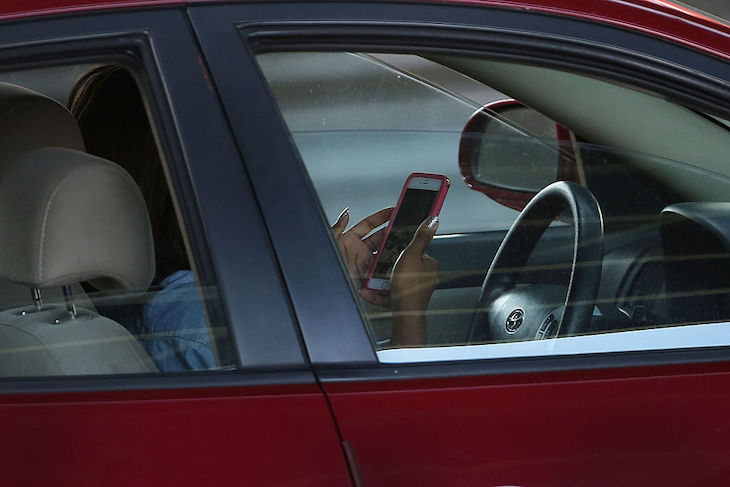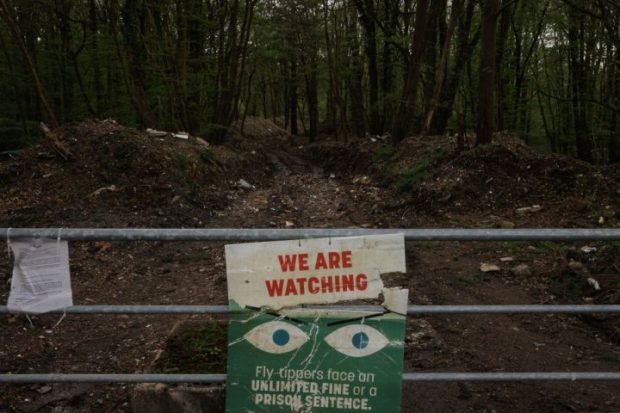Jeremy Bentham, thou shouldst be alive and doing a ton through the Mickleham Bends at this hour. Bentham’s great contribution to carceral theory, as most readers will know, was the panopticon. He imagined a prison where the cells were arranged in a rotunda so a guard in the middle could watch every prisoner without having to clop round from cell to cell. What was so clever about the idea, and why it fired Michel Foucault’s imagination, was not that it saved shoe-leather. It was that, because the prisoners didn’t know whether they were being watched or not at any given time, they would be forced to assume that they were and behave accordingly.
Now, a free phone app called dashcamUK promises to turn the southbound A24 into a digital realisation of Bentham’s dream. This app’s USP isn’t just that it uses the smartphone camera as a dashcam, keeping thirty seconds of footage in working memory at any time – but that if you see another driver doing something wrong, such as shooting a red light, texting at the wheel or changing lane without indicating, with a single quick tap of the screen it’ll save the footage; all ready for you to submit it to the police. It’s claimed the technology will soon be good enough to submit prosecution-ready evidence of speeding offences.
We’re all a little conflicted on the question of speed limits
I can imagine some people reaching with a pleasurable thrill of indignation for words like ‘Stasi’, ‘Big Brother’, ‘totalitarianism’ and so on, horrified by this attack on the ancient right of every free-born Englishman to push ninety on the M4 when he thinks he can get away with it. Me, I think it’s the seed of an excellent idea. I certainly wouldn’t bet against it being normal ten years from now.
There’s the odd wrinkle to be ironed out, of course. One can see the courts getting clogged up with drivers whose defence against the charge of using a mobile phone while driving was that they were using their mobile phone to dob in someone else (probably their accuser) for using their mobile phone while driving. The volume of submissions from busybodies would probably overwhelm police capacity: the cops would spend a lot of time explaining that, no, sitting in the middle lane doing 50 like a plonker is not actually a criminal offence. And think of the road-rage incidents.
The wrinkle to be ironed out, then, is having the actual owners of the smartphones involved. Among other things, the element of human discretion gives the whole thing that morally icky feel of people informing on their fellow citizens. But there’s no reason to suppose that artificial intelligence can’t already do the trick. If AI can already (nearly) drive a car, I’m pretty sure it’s capable of telling whether the one in front is doing eighty in a sixty zone, or turning left without signalling, before passing the evidence on for verification. There’s no shortage of public-spirited people who’d install one of these things and be happy for an algorithm to do the snitching for them.
Bentham’s idea – that the prisoners effectively police themselves because they know they may be being watched – is just what supporters are hoping DashcamUK will bring into being. ‘If drivers believe that they’re being watched by others,’ James Gibson of Road Safety UK told reporters, ‘we hope they will drive in the right way.’ I think he’s right. They – we – will. That’s not to say they – we – won’t do so reluctantly and with a bad grace, though.
We’re all a little conflicted on the question of speed limits. You won’t find very many people who don’t think that we should have them at all. Equally, you’ll struggle to find very many people who think that speed limits should be rigidly applied to them. Cars with speedos where the 70mph mark is well before noon on the dial are given appreciative write-ups in the motoring pages, and you’ll hear sage arguments for why having ten or twenty miles per hour leeway can be vital to get out of trouble in a tricky spot. There’s a special type of dreary bloke who will drone on given half a chance about how an experienced driver (like him) knows that the correct speed is a matter of judging weather, crosswinds, road conditions, camber, volume of traffic and so on, not submitting to a crude one-size-fits-all limit. The guy who drives too fast and flattens a pedestrian, in other words, is always some other idiot – right up until it isn’t.
We acknowledge that any law needs enforcement: that there’s good reason for the existence of speed traps and speed cameras. We therefore know, at least in theory, that if the police had limitless resources there’d be no argument in principle against having a speed camera every hundred metres. But even though if every driver without fail kept below the limit it would beyond question reduce the number of deaths on the road, we still tend not to do so because a) we think we’re the exceptions to the rule and b) we’re confident that most of the time we won’t get caught.
You’ll never stop people thinking a). But you’ve a very good chance of stopping them thinking b) if they know that every carriageway is bristling with private speed cameras connected to a pitiless algorithm which is having absolutely none of your BS about how cleverly you read the road conditions or your windy speechifying about the road to totalitarianism. What’s not to like?
As well as saving lives, such a set-up will save money: money that used to be spent on in-person traffic policing and scraping people off roads, but can now be spent on more important policing priorities such as roughing up female protesters and arresting people for making jokes on social media.
Got something to add? Join the discussion and comment below.
Get 10 issues for just $10
Subscribe to The Spectator Australia today for the next 10 magazine issues, plus full online access, for just $10.





















Comments
Don't miss out
Join the conversation with other Spectator Australia readers. Subscribe to leave a comment.
SUBSCRIBEAlready a subscriber? Log in